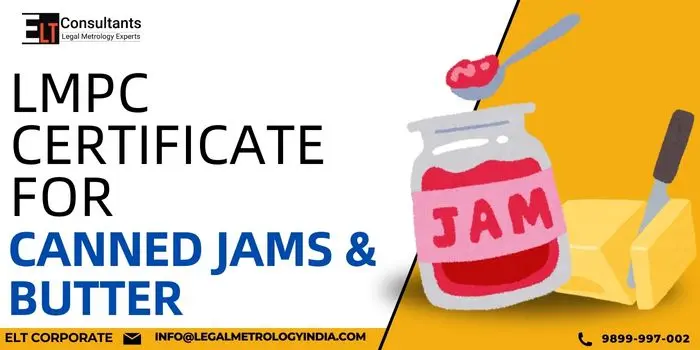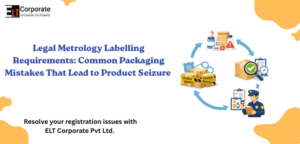Do you know that an LMPC certificate for Canned jam and Butter is very important if you are a manufacturer, importer, or distributor of them? Understanding it is very overwhelming but kind of serious for pre-packaged commodities. Brand holders need to register for a Legal Metrology Packaged Commodity license to build trust between consumers. So now, to learn all the details related to its documentation and the procedure to apply for an LMPC certificate for Canned jams, you have to read the article.
What is an LMPC Certificate for Canned James and Butter?
The LMPC Certificate, known as the legal metrology packaged commodities certificate, is required by the legal metrology department in India. It is necessary to ensure that every consumer knows that products are packed with quality by showing proper labelling. Labelling of the product should consist of these essential items like its weight, price, manufacturing premises address, manufacturing dates, expiry dates and so on. The company requires all these activities to make their place among consumers so they can easily trust and buy the products. For better marketing, you should remember that it is essential to register an LMPC certificate for canned jams and butter because your company might avoid serious legal troubles with it.
Why do you Need an LMPC Certificate for Canned Jams?
If you still don’t know why you need an LMPC certificate for Canned jams and butter, we have mentioned some factors you might like to understand before going further.
- Legal Requirement – In India, you must secure an LMPC certificate to lawfully market imported packaged goods like canned jams and butter. Selling these products or any pre-packaged commodities without LMPC registration can create significant negative situations.
- Consumer Security – As you know, it is important and right for consumers to know what they consume and what items it contains. So, it is very much necessary to provide adequately labelled items. These small details are considerable changes in bringing transparency, ultimately increasing consumer trust.
- Avoiding Legal Penalties – There are many reasons to get certified by LMPC to avoid unnecessary pathetic legal acquisitions against your products. However, if you are still working in the market without an LMPC certificate, you will be caught and get into major trouble, like a huge fine or ban on your product.
Where Can You Apply for an LMPC Certificate for Canned Jams and Butter?
It is a relatively easy task to do. To apply for an LMPC certificate for Canned jams and butter, you can visit the legal metrology department or try to apply through an online portal. Certainly, if you don’t want to take any burden, you might have to check the best regulatory consultancy to get work done. To help you understand the process of applying for the LMPC certificate registration, we have mentioned the details as follows:-
- Prepare Necessary Documents—You must pre-plan everything, including documentation, and collect all the documents, including the business registration certificate, packaging details, and compliance record.
- Submit Your Application at Online Portal—Now that you are prepared, submit the application through its online platform to apply for LMPC Certification. Check that all required details are correct to avoid future trouble.
- Approval Process of LMPC certification—Authorities will review your documents if the process goes all right, like your application submission. So, if all these things go well with the given direction, you will get your LMPC certificate.
Note—There may be some chances that your documentation and reviewing activity doesn’t go as you expected. Don’t lose hope; try to get in touch with a respected consultancy and clear your doubts.
Who Needs an LMPC Certificate for Canned James and Butter?
The manufacturers, Retailers, Distributors, and Importers require an LMPC certificate for Canned jams and butter.
How Long Does it Take to Get an LMPC Certificate for Canned Jams?
Generally, getting an LMPC certificate for Canned Jams and Butter takes two to four weeks. Remember to check these things to get an LMPC certificate on time: document accuracy, department processing, and compliance verification. So, it’s advised to contact the legal metrology department so that if any problems occur, you can solve them within the given period.
What are the Benefits of Having an LMPC Certificate for Canned Jams and Butter?
The LMPC certificate for pre-packaged commodities like footwear, soups, breakfast cereals, and energy bars offers several benefits. Here, we have mentioned some benefits of registering your packaged commodity benefits:-
- Legal Compliance
- Consumer Trust
- Expanding Markets
- Avoiding Legal Disruptions
How Can You Renew the LMPC Certificate for Canned Jams?
You can renew your LMPC Certificate for canned jams and butter by following these easy steps:-
- Keep an Eye on the License Expiry Date
- Submit Renewal Application on the Legal Metrology Online Portal
- Submit the Required Fee for the LMPC Certificate Renewal
Conclusion
It is essential for every business manufacturing, importing, retailing, and distributing pre-packaged commodities in the market to get an LMPC certificate. This helps ensure that the product has accurate labelling and is made with proper standards set by the legal metrology department of India. In this article, you can check all the details for legal metrology packaged commodity certification as we try to list all the information.
Why is the LMPC Certificate Required?
LMPC Certificate is required to ensure that labelling is accurate and the product is packed with quality.
What is LMPC Full Form?
LMPC’s full form is for Legal Metrology Packaged Commodity.
Do imported Canned Jams & Butter require an LMPC Certificate?
Yes, all imported canned jams and butter must comply with the Legal Metrology regulations and require an LMPC certificate before being sold in the Indian market.
What are the penalties for selling Canned Jams & Butter without an LMPC Certificate?
Selling canned jams and butter without an LMPC certificate can lead to penalties, including fines and legal action under the Legal Metrology Act. Non-compliance can result in product seizures, fines, or even cancellation of business licenses.








